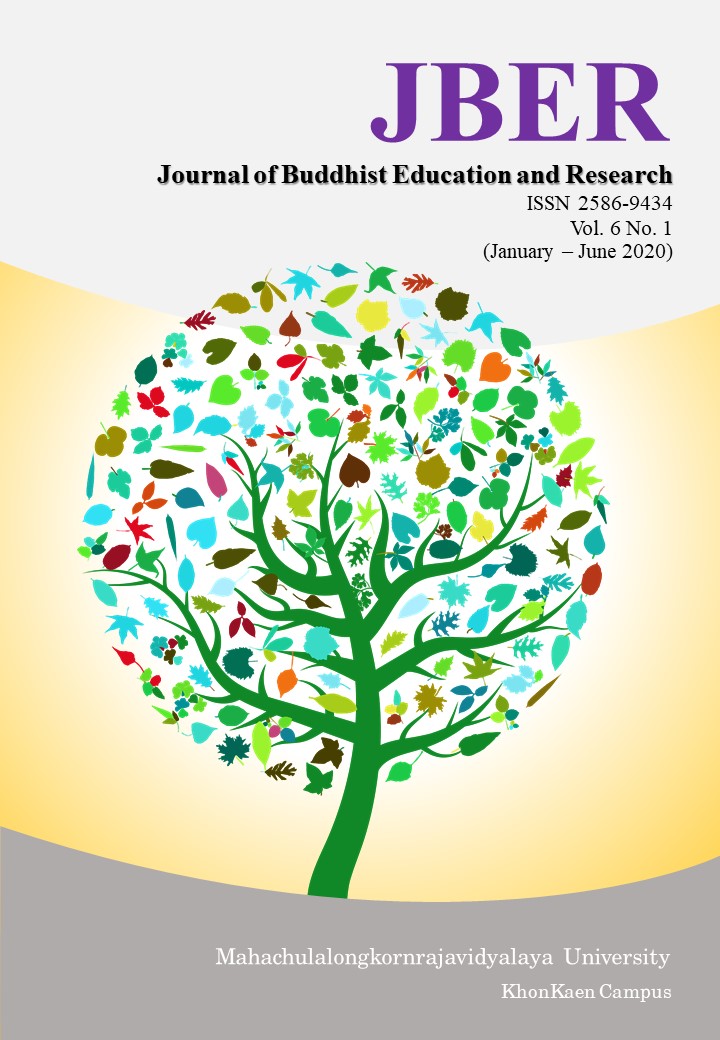SCHOOL ADMINISTRATORS’ TASK ADMINISTRATIONS WITH BUDDHISM’S FOUR SUBLIME STATES OF MIND AT SCHOOLS WITH BUDDHISM’S FOUR SUBLIME STATES OF MIND AT 2ND NONGKRUNGSRI NETWORK CENTRE’S EDUCATION QUALITY DEVELOPMENT SCHOOLS UNDER PRIMARY EDUCATION SERVICE AREA OFFICE 2
Keywords:
Buddhism’s Four Sublime States of Mind, administrationAbstract
Objectives of the research aimed: 1) to investigate a benchmark for school administrators’ (the former’s) task administrations with Buddhism’s Four Sublime States of Mind at 2nd Nongkrungsi Network Centre’s Education Quality Development Schools under Primary Education Service Area Office 2, 2) to draw comparisons of informants’ (the latter’s) opinions based on genders, ages, and working experiences, 3) to examine suggestions for enhancing the former’s task administrations. The sampling groups comprised 133 teachers-cum-informants. The data collection instrument was the five-rating-scale questionnaire with IOC between 0.67 and 1.00, including reliability throughout the entire set at 0.984. Data were processed with the software package. Statistical units for analyzing data encompassed frequencies, percentages, means, standard deviations, t-tests, and F-tests (One-way ANOVA).
Research findings have revealed following outcomes:
1) The benchmark for the former’s task administrations with Buddhism’s Four Sublime States of Mind at their schools has been rated at the highest scale in comprehensive and single aspects. Each aspect in the descending order of means embraces loving kindness, loving joy, sympathetic joy, and equanimity respectively.
2) Comparative results of the latter’s opinions on the former’s task administrations with Buddhism’s Four Sublime States of Mind at their schools following the latter’s variables of genders, ages and working experiences do not vary in both aspects.
3) Teachers-cum-informants have offered four recommendations. First, the administrators with loving-kindness dare be assertive, making proper decision, understanding subordinates’ problems and needs. Next, they afford time for rendering advice to show subordinates. Rather, they inquire the latter’s task difficulties and requirements. Then, they express good wishes and admirations to subordinates with sympathetic joy to boost their morale for duty performance. Last, they demonstrate neutrality, equality and fair treatment to subordinates with equanimity.
References
ณัชชา อมราภรณ์. (2557). การบริหารงานตามหลักพรหมวิหารธรรมของผู้บริหารสถานศึกษาเขตสายใหม. วิทยานิพนธ์ปริญญาพุทธศาสตรมหาบัณฑิต สาขาวิชารัฐประศาสนศาสตร์. บัณฑิตวิทยาลัย มหาวิทยาลัยมหาจุฬาลงกรณราชวิทยาลัย.
ธานินทร์ ศิลป์จารุ. (2555). การวิจัยและวิเคราะห์ข้อมูลทางสถิติด้วย SPSS และ AMOS. (พิมพ์ครั้งที่ 13). กรุงเทพฯ: บิสซิเนสอาร์แอนด์ดี.
นงเยาว์ ภูน้ำย้อย. (2558). การใช้หลักพรหมวิหาร 4 ในการบริหารศูนย์พัฒนาเด็กเล็ก สังกัดองค์การบริหารส่วนตำบล อำเภอยางตลาด จังหวัดกาฬสินธุ์. สารนิพนธ์ศึกษาศาสตร์มหาบัณฑิต. สาขาวิชาการบริหารการศึกษา. บัณฑิตวิทยาลัย มหาวิทยาลัยมหามกุฏราชวิทยาลัย.
ประเวศ วะสี. (2544). ยุทธศาสตร์ทางปัญญาและการปฏิรูปการศึกษา. ในรายงานการประชุม เรื่อง วิสัยทัศน์และยุทธศาสตร์ทางการปฏิรูปทางการศึกษา : วาระแห่งชาติ. กรุงเทพฯ: วัฒนาพานิช.
พรนภา ชำนินอก. (2558). การใช้หลักพรหมวิหาร 4 ในการบริหารโรงเรียนศูนย์เครือข่ายพัฒนาคุณภาพการบริหารการศึกษายางตลาด 3 จังหวัดกาฬสินธุ์. สารนิพนธ์บัณฑิตวิทยาลัย มหาวิทยาลัยมหามกุฏราชวิทยาลัย.
พระพรหมคุณาภรณ์ (ป.อ. ปยุตฺโต). (2551). พจนานุกรมพุทธศาสตร์ ฉบับประมวลธรรม.(พิมพ์ครั้งที่ 16). กรุงเทพฯ: บริษัท เอส.อาร์ พริ้นติ้ง แมส โปรดักส์ จำกัด.
พระมนัส อคฺคธมฺโม (ก้อนใหญ่). (2554). ภาวะผู้นำของผู้บริหารสถานศึกษาตามหลักพรหมวิหาร 4. วิทยานิพนธ์พุทธศาสตรมหาบัณฑิต. สาขาวิชาการบริหารการศึกษา. บัณฑิตวิทยาลัย มหาวิทยาลัยมหาจุฬาลงกรณราชวิทยาลัย.
พิณสุดา สิริธรังสี. (2552). ภาพการศึกษาไทยในอนาคต 10-20 ปี. รายงานการวิจัย.กรุงเทพฯ: สำนักนโยบายและแผนการศึกษา สำนักงานเลขาธิการสภาการศึกษา.





